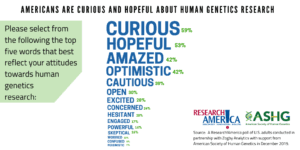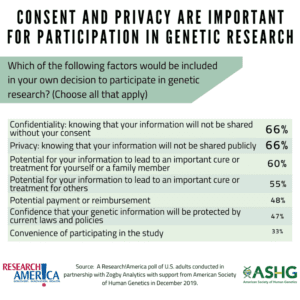March 2020

Research in human genetics and genomics is moving rapidly into all areas of science and health, and it’s important to understand public views of research progress and participation in research. By understanding how the public views our field, we can identify opportunities for new programs that help us fulfill our vision that people everywhere realize the benefits of human genetics and genomics research.
A few weeks ago, we released two new public opinion resources:
- A new national survey of American attitudes about many areas of our research, commissioned by ASHG and implemented with our partner Research!America.
- A broader literature review that reports on many additional important academic and public works and explores many topics beyond those in our survey.
We’re excited to report overall the very positive and hopeful views Americans hold toward our research for medicine and health applications. Overall, the U.S. public is supportive of human genetics research and believes it is important to their health and that of their families and the nation. They affirmatively support additional research in human genetics and greater funding for it, are curious and optimistic about research findings, and believe research will benefit national health.

As a geneticist, these findings are energizing. Positive public opinion of our science and its potential is a strong starting point for the growing public engagement efforts outlined in our 2019 Strategic Plan. It will help us shape our future programming to answer common questions, build on hopes for the field, and strengthen the hopeful feelings that our friends and neighbors have about genetics and genomics research.
At the same time, members of the public have some concerns about confidentiality and privacy in research participation. They seek assurances they will be protected, even as they also want genetic information used appropriately to help their families’ medical needs.

ASHG members and leadership share these concerns, and our community is working to understand and address them to move the science forward in a responsible way. For example, in September, we published a Perspective in AJHG that asserted core data privacy principles that should be applied to all genetic research.
The survey also explores areas of possible difference among diverse populations, which will help set a course for more informed public understanding and engagement. Analyzing the poll’s oversampling of underrepresented populations, their views were consistent overall with those of the full population, but also provide a window into select areas of higher enthusiasm, lower awareness, or greater skepticism. In addition, the survey illuminates some areas for public education, including common misconceptions about human genetics concepts. For example, awareness was low about existing laws like the Genetic Information Nondiscrimination Act, which protect genetic privacy in the workplace and in health insurance.
The public also had low awareness of the degree of genetic similarity across humans – only four in ten respondents knew that among all humans, more than 99% of our DNA is identical. Reinforcing messages like this will not only improve genetic literacy among nonspecialists, but underscore the commonalities we share as a species while celebrating the traits that make each of us unique.
Collectively, ASHG members are transforming science and medicine on a daily basis, applying so much that we now know into translation and clinical practice while exploring what is exciting and unknown about fundamental biology and function. It’s a fast-paced time for our field, and I’m heartened to see that the public feels so positively about it.
In coming months, ASHG will continue to examine the survey data and provide further analysis. We will also increase communication about the value of human genetics to the public, including webinars, papers, and public information and engagement on topics related to current advances and issues in human genetics and genomics.
